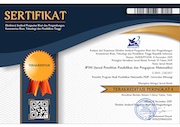Implementasi pembelajaran investigasi berbantuan Software Cabri 3D terhadap kemampuan pemecahan masalah matematis dan kemandirian belajar mahasiswa
Abstract
This study aims to determine the effect of the application of instructional investigation-assisted Cabri 3D software to students’ mathematical problem-solving abilities, knowing the difference of mathematical problem solving ability among students who received instructional investigation with the help of Cabri 3D software with those who obtained conventional learning seen from high, low and describe the independence of student learning on the application of investigative learning assisted Cabri 3D software. The method used in this research is the descriptive quantitative method. The population in this study is all students of Mathematics Education Department of Siliwangi University class of 2015/2016, while the sample in this research is the students who take the subjects of Kapita Selekta Matematika SMA II as much as two classes. The first class consisted of 30 students, used as an experimental group using instructional investigation assisted by Cabri 3D software and second class consist of 31 students, used as the control group with learning using conventional learning. Based on the research results, it can be concluded that (1) There is a positive influence of the application of investigative learning with the help of Cabri 3D software to the students’ mathematical problem-solving abilities. The outcome target of this research is scientific publication published in the national journal having ISSN and proceeding at the national seminar on mathematics education.
Full Text:
view PDFReferences
Darminto, P.B. (2009). Studi Perbandingan Model-Model Pembelajaran Berbasis Komputer Dalam Peningkatan Kemampuan Berpikir Matematis Tingkat Tinggi Calon Guru Di Perguruan Tinggi Muhammadiyah. Disertasi SPs UPI. Bandung: Tidak Dipublikasikan.
Fahinu. (2007). Meningkatkan Kemampuan Berpikir Kritis dan Kemandirian Belajar Matematika pada Mahasiswa melalui Pembelajaran Generatif. Disertasi Doktor pada SPS UPI: Tidak Diterbitkan.
Flenor. (1974). The Teaching Strategy: Investigating School Mathematics. London: Addison-Wesley Publishing Company.
Hidayat, E. (2015). Peningkatan Kemandirian Belajar Siswa Sekolah Menengah Pertama dengan Menggunakan Pendekatan Realistik. Prosiding Seminar Nasional Pendidikan Matematika, Program Studi Pendidikan Matematika FKIP Universitas Siliwangi Tasikmalaya.
Pape, S. J. et al. (2003). “Developing Mathematical Thinking and Self-Regulated Learning: Teaching Experiment in Seventh-Grade Mathematics Classroomâ€. Journal Educational Studies in Mathematics. 53, 179-202.
Polya, G. (1973). How to solv it. A new aspect of mathematical method (second edition). Princeton, New Jersey: Princeton University Press.
Ruseffendi, E. T. (2010). Dasar-dasar Penelitian Pendidikan dan Bidang Non-Eksakta Lainnya. Bandung: PT Tarsito.
Setiawan. (2006). Model Pembelajaran Matematika dengan Pendekatan Investigasi. Depdiknas: Yogyakarta
Sumarmo, U. (2010). Berpikir dan Disposisi Matematik: Apa, Mengapa, dan Bagaimana Dikembangkan Pada Peserta Didik. Makalah yang tidak dipublikasikan.
DOI: https://doi.org/10.37058/jp3m.v3i1.198
Refbacks
- There are currently no refbacks.
©2017 JP3M (Jurnal Penelitian Pendidikan dan Pengajaran Matematika)
Program Studi Pendidikan Matematika
Fakultas Keguruan dan Ilmu PendidikanÂ
Universitas Siliwangi
Jl. Siliwangi No. 24 Kota Tasikmalaya - 46115
email: jp3m@unsil.ac.id
e-ISSN: 2581-2807 ; p-ISSN: 2460-8599

This work is licensed under a Creative Commons Attribution-NonCommercial-ShareAlike 4.0 International License.
StatCounter:
Detail


